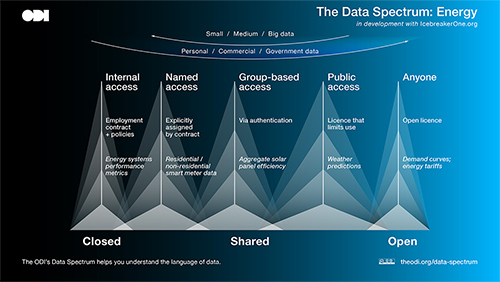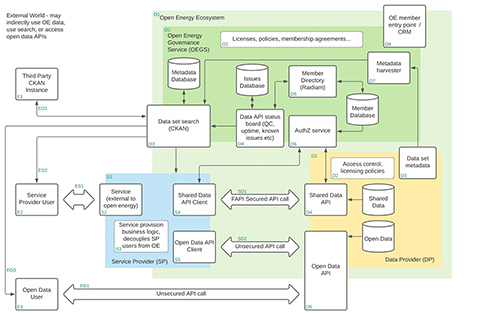The UK was one of the first countries to declare a target for carbon neutrality - net zero by 2050. Net zero means achieving a balance between carbon generated and the carbon removed, all while meeting the UK’s growing energy demands. Achieving balance needs:
- a combination of lower carbon energy sources;
- increasing energy efficiency;
- more local generation;
- the removal or capture of carbon;
- significant social and behavioural changes.
Data is essential to monitoring, measuring and supporting this progress; effective data handling is critical to achieving net zero. As you read on, we’ll explore how data can and is changing the world around us.
Data and the future of energy
The UK government recognises the importance of organised and dependable data as an element of basic infrastructure. This puts data on an equal footing with electricity, telecoms, roads and railways, which is increasingly important as electricity generation, storage and use is decentralised.
Millions of “assets” like solar panels, turbines, batteries, electric vehicle charge points and smart meters, will need to be able to communicate with the operators of our networks, market platforms and each other.
New and existing data points will generate data that needs to be captured and exploited within new business models.
Driving Innovation in Data
Innovate UK, an independent government agency, is supported by the energy regulator OFGEM and The Energy Systems Catapult in setting the agenda for energy data. The latter is a not-for-profit agency established in order to accelerate the energy transition.
These agencies defined the comprehensive Energy Data Strategy, principles and guidance (see Box 2) as part of their role to encourage innovation with energy data. Innovate UK launched the Modernising Energy Data Access (MEDA) competition, designed to enable increased sharing of energy data for the benefit of society.
How does making data 'open' help?
The best way to illustrate the benefits of open energy data is by use cases. The following are two real examples where energy users are looking for data to support energy efficiency plans:
- A local authority is planning to install electrical vehicle charging points. It is a complex decision to choose the sites and there is a high dependency on grid capacity within that local area. This data about grid capacity is held by the local electricity provider. The local provider is usually happy to share. A simple request can be easily fulfilled, though it may take a few days. There may be some back-and-forth around data formats, future plans, additional locations, etc. Several weeks later, the local authority gets the data it needs.
- ‘Hello Tom, this is Claire. We spoke last week about the meter data for my client.’
‘Oh Hi. Yes, I sent you the spreadsheet last night.’
‘Thanks for that. It is useful but it shows only daily usage. I thought you would be able to send me data on hourly usage per meter?’
‘Possibly, yes. I will have to get someone to have a look at it for you, as I am on leave for the next two weeks.’
‘Well can I put in a request for weekly updates for the next two months or so too?’
‘Put it in an email and we will see what we can do.’
Each case is relatively simple to resolve but takes longer and involves more interaction than is necessary. Progress in each case depends on good will. Each case demonstrates how delays in access to data leads to delays in implementing plans for lower energy usage. Now imagine the electricity provider receiving 20 requests each week and the specialist consultant wanting to look at a range of different data sets and models from different providers.
Gavin Starks, CEO of Icebreaker One, recognises the problem and suggests that value could be unlocked by resolving the ‘many to many’ between data suppliers and data consumers. Icebreaker One has developed the Open Energy concept in response to the MEDA innovation challenge.
Icebreaker One wins the MEDA challenge
From a wide range of responses from companies large and small, Icebreaker One’s Open Energy programme was selected as the best chance to deliver the step-change needed.
Icebreaker One was founded in early 2020. It is a not-for-profit organisation that aims to make data work harder in order to deliver net zero. Before Icebreaker One, Starks was CEO of the Open Data Institute (ODI) where concepts of open and shared data have been explored and developed (see figure 1).
Significantly, Starks also lead the development of Open Banking (see Box 1). The processes and steps taken for design and implementation and the success of open banking have been an inspiration and a model for Open Energy.
Figure 1: The Data Spectrum, categories of data for sharing, Open Data Institute (click to view larger image)
Starks believes that Open Energy is a larger and more complicated concept than Open Banking. ‘Banking data is typically in a very orderly state when compared to typical energy data. The banks already work within international standards for data sharing and have well established processes for data exchange,’ according to Starks. ‘Aspects of Open Banking served as a very useful template for Open Energy and open banking continues to prove the business case,’ he continues.
What is open energy?
The Open Energy programme aims to develop a standard, a set of governance rules, as a platform for sharing energy data - primarily electricity data. Following the MEDA award, the programme will deliver a proof of concept for a specific user case within six months.
The programme has developed through a series of consultations with stakeholders from the industry. It was brought to life through a use case, a local authority retrofit with low carbon technology.
Starks believes in making progress by practical action and breaking down barriers as they arise dependent on the specific use case. Starks is determined that project progress and the approach are kept as open as possible too. He says: ‘There are likely other initiatives running in associated fields and we need to take opportunities to collaborate where it makes sense.’
The Open Energy programme is delivering a framework of tools, including a prototype search portal and a set of governance rules for energy data sharing. This framework will handle the definition of the participants and their roles for the scope of data involved, the criteria for authorising access and even the liability model for resolving disputes.
When the data is made available and backed by sharing agreements, this will be a thriving ecosystem of trusted energy data, within a controlled, decentralised model. It will be an implementation of the UK’s vision for energy data and will be adaptable as requirements evolve - see Figure 2.
Figure 2: Open energy ecosystem/ map (click to view larger image)
Challenges to be overcome
The Open Energy programme faces a range of challenges in order to deliver the envisaged innovation. There is a very wide range of data types and we need a clear definition of the key data types and metadata for each use case. However, there are a number of industry taxonomies and catalogues to choose from. Starks is unfazed: ‘We will work with the one that best fits our use case, we can’t let the perfect be the enemy of the good.’ A range of security actions will be needed, including anonymising data to protect individuals’ rights and managing more sensitive network asset data.
Most of the data for the system will come from the energy companies. Each energy company is on a digitalisation journey of its own and within each digitalisation programme, they will need to develop processes to make good quality data securely available to authorised users.
It is important that open energy makes this data sharing easier. Energy companies will benefit from better, more widely adopted data definitions and governance over data sharing. Whether the potential benefits for the energy companies will be sufficient, or whether data sharing will need to be supported by stronger regulation, remains to be seen.
Open energy delivers
As this critical data is shared more widely, innovation will increase, analytics will shine a light on all corners of the data sets and apps will be developed. Energy users will have the data needed to make decisions and define plans more quickly, with reduced risk. Implementing these plans will reduce energy use and move huge sectors of the economy towards net zero.














